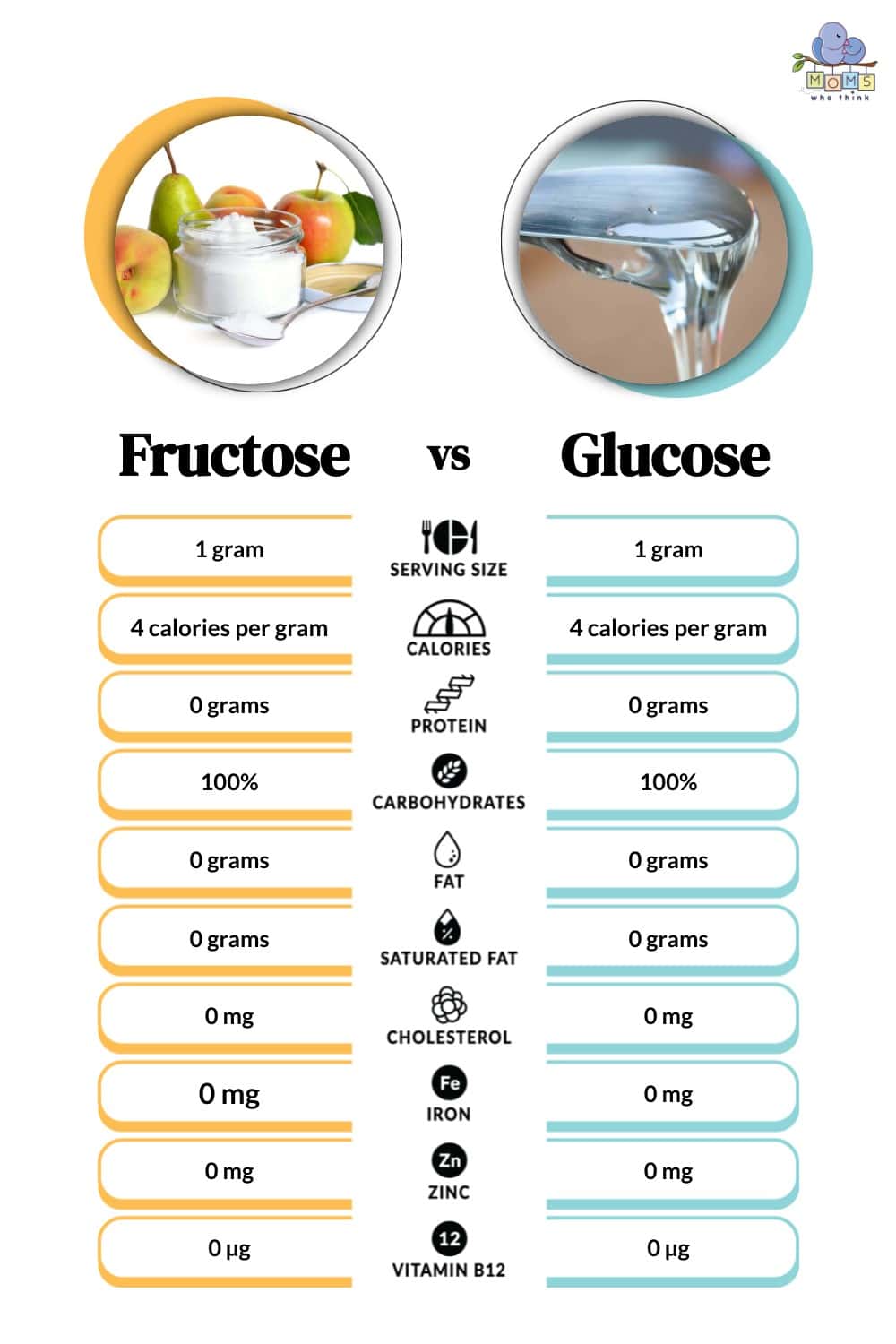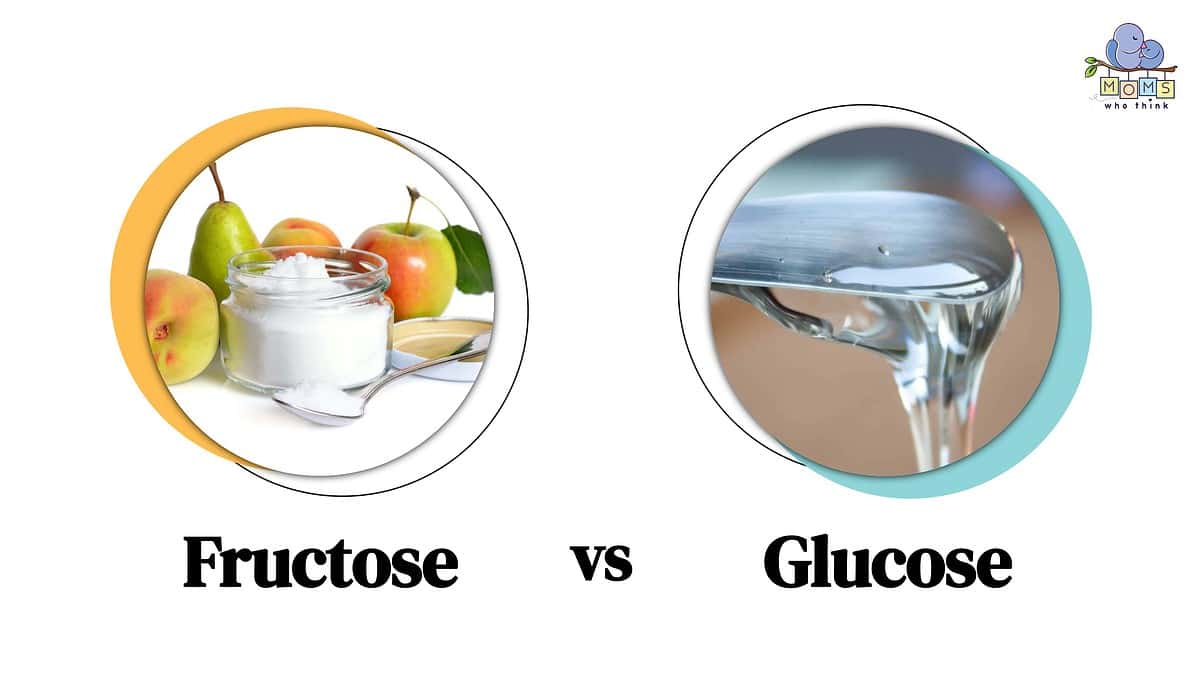Sugar has become quite a hot topic for good reason. Consuming too much sugar can lead to many health problems. Consequently, understanding that not all sugars are created equal is crucial. Being aware of their differences is critical when deciding which one to use. One significant difference between fructose vs glucose is how they affect blood sugar levels. Fructose causes a slower increase compared to glucose. This article will explore the basics, differences, suggested amounts, and more.
Fructose vs. Glucose: The Basics
Both fructose and glucose are simple sugars. Many foods and drinks in our regular diets contain both of them. Although they both consist of the elements carbon, hydrogen, and oxygen, their chemical structure is different. This difference affects how our bodies metabolize these sugars and how they affect our health.
Fructose
Fructose is mainly present in fruits, honey, fruit juices, and certain vegetables. It is in table sugar as high fructose corn syrup (HFCS), commonly used as a sweetener in processed foods. Often referred to as ‘fruit sugar,' fructose adds to the sweet taste we experience when eating fruits.
Glucose
Glucose is in various foods such as fruits, vegetables, wheat products, sweeteners, sodas, and desserts. Our bodies naturally convert most carbohydrates into glucose because it serves as the primary energy source for our cells.
Fructose vs. Glucose: Nutrient Composition
When looking at fructose and glucose, they differ in chemical makeup but contain the same amount of calories. Both sugars provide about four calories per gram. Additionally, fructose is sweeter than glucose, meaning that we need a smaller amount of fructose to achieve a similar level of sweetness.
Despite their similar calorie content, our bodies process these two sugars differently. The intestines absorb glucose. Our cells use it for energy after it enters the bloodstream. Meanwhile, the liver metabolizes fructose. There, it is changed into glycogen (which can later be changed into glucose and sent to other cells for energy) or fat (long-term storage).

Fructose vs. Glucose: Health Impacts
The different ways our bodies process fructose and glucose have varying health impacts. Let's explore some of these differences.
Blood sugar and insulin response
Too much glucose leads to rising blood sugar levels. As a result, the body releases insulin to adjust the spike in blood sugar. Fructose, on the other hand, does not cause blood sugar to spike. As a result, this prompts a milder insulin response. The impact on insulin has both pros and cons for fructose. Initially, it makes it a safer choice for individuals with diabetes. However, the long-term dangers counter this since it leads to insulin resistance and metabolic syndrome.
Fat storage and weight gain
When it comes to storage and weight gain, heavy fructose consumption can lead to an increase in fat storage located in the liver. This increase in fat storage is because the liver processes fructose differently from glucose by changing it into either glycogen or fat. As a result, regularly consuming large amounts of fructose can lead to non-alcoholic fatty liver disease, obesity, and a high risk of heart disease. On the other hand, cells immediately use glucose for energy. Therefore, it leads to less fat storage.
Appetite control
Let's explore how these two sugars affect the way we eat. Keeping glucose at a healthy level increases feelings of fullness and decreases hunger. On the other hand, fructose may increase feelings of hunger and lead to eating too much. This potentially increased appetite makes fructose less suitable for those who want to lose weight or eat less.
Fructose vs. Glucose: How Much Is Too Much?
After learning the health impacts, this leads us to question how much is too much when consuming fructose and glucose. Without question, moderation is key when including them as part of your diet. Strive not to consume more than the suggested sugar levels.
The American Heart Association advises women to limit their added sugar consumption to six teaspoons daily, while men should aim for no more than nine teaspoons. They also recommended avoiding processed foods packed with high amounts of added sugars. These added sugars offer no value and are very high in calories.

©/ via Getty Images
Fructose vs. Glucose: Tips for Reducing Sugar Intake
- Pay attention to food labels. Choose unsweetened products whenever available.
- Choose fruits instead of fruit juices, as the juices often contain additional sugars.
- Swap out drinks like soda or energy drinks with water or herbal tea.
- For a sweet treat, discover dessert alternatives, such as Greek yogurt with fresh fruit.
- Select low-sugar snacks rich in fiber, such as nuts and seeds.
- Limit your intake of processed foods, especially those that include high fructose corn syrup in their ingredients.
- Prioritize whole grains over refined grains to incorporate more fiber and vitamins into your diet.
- Remember that monitoring sugar intake is only one part of maintaining a healthy diet; eating nutritious foods and exercising regularly is equally important.
Fructose vs. Glucose: Frequently Asked Questions
Which foods are known to have high fructose levels?
Fruits are a primary source of fructose, with certain fruits like pears and watermelon containing higher levels than others. In our diets, high fructose corn syrup (HFCS) significantly contributes to our fructose intake and can be found in many processed foods such as sodas, fast food items, and baked goods.
When compared to glucose, is fructose more beneficial for individuals with diabetes?
Fructose does not cause a quick blood sugar spike or trigger insulin release to the same extent as glucose. Initially, this might make it seem like a good option for individuals with diabetes who need to manage their blood sugar levels. However, consuming too much fructose can lead to metabolic issues like insulin resistance and fatty liver disease. Therefore, people with diabetes should consume fructose in moderation along with wholesome foods.
Is it safe to consume a lot of fruits?
Eating fruits is generally considered healthy and safe when eating a balanced diet. Fruits provide essential vitamins, minerals, and antioxidants that improve our health. However, it's best to avoid processed fruit products that contain added sugars, as overconsumption can result in weight gain and other metabolic issues over time.
Can sugar have beneficial effects on health?
Yes, having a small amount of sugar can benefit your health. For instance, it gives you a burst of energy when you're physically active. However, it's important to remember that in the long run, consuming excessive amounts of sugar can majorly impact your health by causing weight gain and increasing your risk of diabetes.
What are the recommended sugar substitutes?
Natural sweeteners like honey, maple syrup, and agave can be great alternatives to processed sugars. There are also low-calorie options like stevia, monk fruit extract, and erythritol. While these may have fewer calories than sugar, it's still important to enjoy them in moderation as part of a well-balanced diet. You can try treats like fruit smoothies or dates if you're looking for healthy sweets without added sugars.

In summary, fructose and glucose are sugars that affect our bodies and health differently. It's crucial to understand the roles they play so that you choose the best option. Most importantly, consume them in moderation as part of a balanced diet. By reading food labels, avoiding processed foods as much as possible, and choosing healthier alternatives for sugary treats, we can ensure that our sugar intake stays within recommended limits.
Lastly, it's crucial to remember that limiting sugar intake is only a piece of the puzzle regarding maintaining a healthy lifestyle. Regular exercise and consuming a range of nourishing foods also play vital roles in ensuring long-term health. If you suspect your sugar consumption might be excessive, consider consulting with your doctor or nutritionist for guidance on making healthier choices. They can assist you in creating a plan tailored to your lifestyle and health requirements. With the proper knowledge and self-discipline, we can all make changes to benefit our overall health and wellness.
Up Next:
- The Effects of High Fructose Corn Syrup
- Insulin Resistance Symptoms and Treatment
- The Diabetic Diet Essentials
- High Fructose Corn Syrup vs Sugar: What are the Differences?
- Free Blood Sugar Chart To Manage Your Health
The image featured at the top of this post is ©Pixel-Shot/Shutterstock.com.

